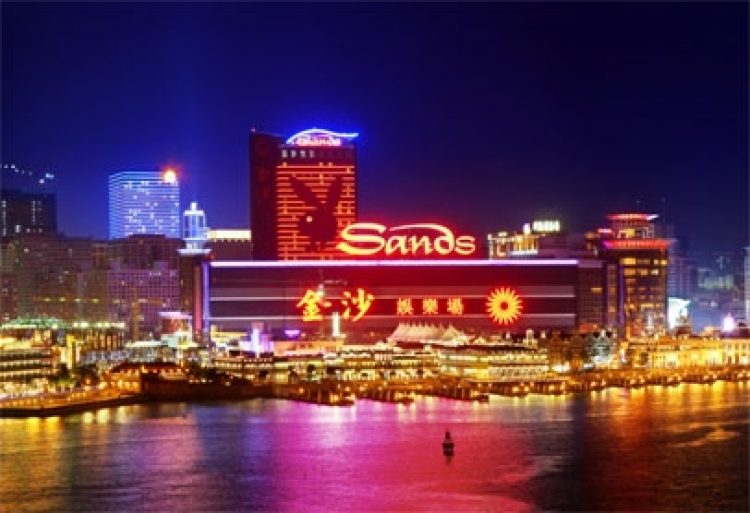Ten years ago, Sands Macao’s opening changed the course of Macau and global gaming history
As Sands Macao employees began arriving for work around 7 a.m. on Tuesday, 18th May, 2004, a crowd was already forming on the street, nine hours before the casino’s scheduled grand opening. Around noon, a rumor spread that guests would receive free chips worth MOP200 (US$25), swelling the crowd. Just before 2 p.m., during a reception for invited guests, security began “freaking out,” according to an executive of Las Vegas Sands Corp. sent from Las Vegas for the opening. LVS Executive Vice President Brad Stone slipped down the escalator from the second-level casino to the lobby and saw thousands of people had surged past barricades and were pressed against the glass entrance doors. Security feared that people would be crushed, hardly the ideal opening day headline for Macau’s first American-operated casino.
“Open the doors now!” Mr Stone yelled. “I want these doors open now!”
But the doors were designed to swing outward, a physical impossibility with the crowd pressed against them. The only option was to yank the doors inward and snap them off their hinges. Guards began pulling furiously on the doors. People outside saw what was happening and joined in. In all, 16 doors were smashed and shoved aside to let people enter Sands Macao, putting conventional ribboncuttings to shame.
The crowd surged toward the escalator and within minutes, the overburdened machine halted and bodies lurched backward. People at the bottom of the escalator tumbled like bowling pins. “I remember the head of security, this big Australian guy, trying to stop people from getting on and help the ones coming down,” a Macau resident in the crowd recalls. “He looked like a superhero, this big gweilo [Westerner] trying to catch these little Chinese people.
Despite those hiccups, 40,000 people visited Sands Macao on opening day, nearly triple its official capacity, marveling at the Paul Steelman-designed interior with high ceilings above 277 table games and 405 slot machines and enjoying the entertainment right there on the bright casino floor while employees dispensed tea, cards and HK$100 chips with smiles rather than scowls. “This was a must-see event that had last happened in 1970 when Lisboa opened,” longtime University of Macau gaming law professor Jorge Godinho says.
“We have the opportunity to learn from one another,” Stanley Ho, who built the Lisboa and held Macau’s gaming monopoly for 40 years, told reporters at the Sands opening behind a broad grin. “The cake is going to be bigger and bigger, and we all could have a share.
But privately he had a different reaction. “When Stanley Ho went up the escalator and saw the Sands gaming floor, his jaw dropped,” a witness recalls. After leaving, Mr Ho reportedly summoned his inner circle and demanded action: “We are Chinese, and we will not be disgraced. We will not lose to intruders.”
Eventually, the gawking guests began to gamble. Even though Sands Macao had no regular junkets, no hotel rooms, no shows and its six restaurants, including the longest buffet in Macau, bled money, the 1 million-square-foot (93,000-square-meter) complex earned back its entire US$265 million construction cost within nine months.
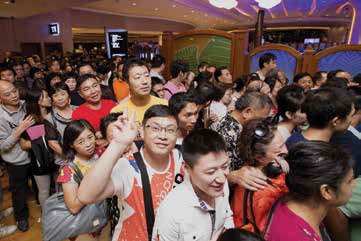
For more on Sands Macao-
Unfinished business: New Macau envisioned by gaming liberalization remains a work in progress
http://staging.staging.asgam.com/mags/2014
Mass Awakening
“We woke up the world to Asian gaming,” a former LVS executive who requested anonymity says. “Sands Macao proved the value and profitability of mass gaming.” From gross gaming revenue of US$3.6 billion in 2003, the final year of the casino monopoly, revenue rose to $5.2 billion in 2004, passed Las Vegas in 2006 and hit $45.2 billion last year, seven times Las Vegas Strip gaming revenue.
“Sands Macao proved mass-market gaming had huge potential,” University of Macau associate business economics professor Ricardo Siu Chi Sen says. “Catering to mass-market players changed the traditional gaming business model here.”
“Sands Macao’s impact was huge. It was the thing that transformed the gaming industry in Macau. Before that, the casinos were fairly sleazy and didn’t have any razzamatazz. Sands brought the Las Vegas buzz to Macau,” Spectrum Asia CEO Paul Bromberg says.
“Mixing American culture with Chinese was totally a new concept,” says Platinum Ltd Managing Director Mary Mendoza, who worked for LVS in marketing when Sands Macao opened. The Macau native says dozens of players became millionaires through Sands’ rewards program, another new concept for the market, and highlights the strategic decision to use simplified Chinese signage favored by mainlanders.
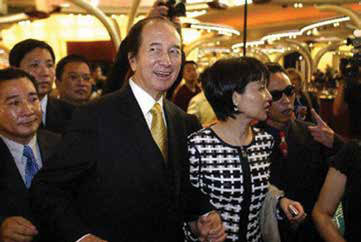
“Sands brought us a different way of gaming,” directly elected Macau legislator Jose Maria Pereira Coutinho says. “It brought color, cultural exchange and an example for other operators of a path for doing something different.”
“I remember the celebratory sense among everyone about Las Vegas now being in Asia,” says Morgan Parker, a guest at the opening who, enthralled by the potential of Macau, left his job as an investment banker to create the shopping mall at Macau Studio City as president of Taubman Asia. (Taubman and Mr Parker exited as the project sat idle for years.) “It was a watershed moment, but for real estate people and casino people it was thin, because we all knew Sands was not the fully fledged Las Vegas experience but merely a rudimentary cash box built for a moment in time. It was perfect, really. The benchmark in Macau at that time was so low that Sands blew people’s minds and raised their expectations.”
“I think practically anyone could have opened a Sands Macao and made it work. I don’t think it reflects on the superiority of Western business acumen,” Newpage Consulting principal David Green contends.
Global Market Advisors partner Steve Gallaway agrees. “The key to Sands Macao’s success was they opened their doors. Until the opening of Sands Macao, Macau was a capacity constrained market. There were simply too few gaming tables and electronic gaming devices available to properly serve gamers in the region.” In 2003, Macau had 434 tables and 814 machines; by the end of 2004, the count grew to 1,092 tables and 2,254 machines; as of 31st March, it’s 5,700 tables and 13,323 machines.
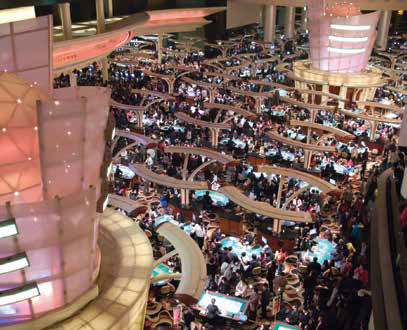
How LVS almost missed out – twice: Bending the rules kept Sheldon Adelson in the game
http://staging.staging.asgam.com/mags/2014
Finally , a Win
Sands Macao’s success broke a losing streak for Macau dating to 1637, when the Portuguese trading post that had elbowed into a Chinese fishing village lost its monopoly on commerce between Japan and Canton (now Guangzhou). Portugal’s envied Asian empire began sinking into irrelevance when it lost control of the passage between the Indian and Pacific oceans with the 1641 fall of Malacca to the Dutch and the China trade opened to other, larger European powers. The silting of Macau’s harbors and the growth of Hong Kong’s more beckoning deep-water port under British rule completed the process.
When Macau returned to Chinese sovereignty as a “special administrative region” (SAR) in December 1999, the outlook was hardly rosy. “Macau was still emerging from what had been a turbulent period in its history, exacerbated by the Asian currency crisis and property collapse of the late 1990s, and the creation of the first SAR administration,” Mr Green says.
What Macau had going for it, aside from its East-meets-West heritage, was gaming. The new government under Chief Executive Edmund Ho hoped to liberalize the market to make Macau a more attractive tourist destination. That meant ending the casino monopoly of Stanley Ho’s Sociedade de Turismo e Diversoes de Macau (Portuguese for Macau Tourism and Entertainment Group), which had controlled the casino business and much of Macau’s subsequent development since 1962.
In November 2001, the government put out a tender for three gaming licenses. STDM, which had its monopoly extended to fit the tender process and keep Macau’s one reliable source of government revenue flowing, would have to bid for a license and face competition. Bidders had to commit to a minimum HK$4 billion (US$500 million) investment, underscoring the government’s desire for non-gaming amenities to complement new casinos.
Aspiring licensees also had to impress an eight-member government Tender Commission, whose proceedings were secret, by law. Much of what’s known about the tender process emerged in US lawsuits against LVS by people claiming they helped LVS get its gaming license. Testifying in one suit, Tender Commission member and government point man on casino liberalization Jorge Oliveira said of Macau, “We, being the only center in China where it is possible lawfully to operate casino gaming, it doesn’t require a genius to make money with casinos there.” In other words, for $500 million, Macau was offering a virtual license to print money.
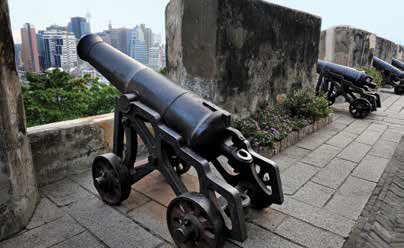
Yet interest from the gaming giants of Las Vegas was muted.
“Their biggest concern was not the size of the investment,” US-based Mr Gallaway says, “but the regulatory regime that was in place prior to 2002. Casino licensees operating in US jurisdictions risked jeopardizing those gaming licenses if they did business in jurisdictions with lax regulatory oversight.”
“Macau’s casinos had acquired a seedy reputation, and there was a perception that Macau would remain in the thrall of STDM,” says Mr Green, who worked on consulting firm Arthur Andersen’s gaming liberalization feasibility study for the Macau government.
“US operators did not understand the concession system, or indeed Macau’s legal system. The concise nature of Civil Law was liable to be confused with an absence of law.”
MGM Mirage, predecessor to MGM International Resorts and the Vegas Strip leader in 2001, mounted an indifferent bid in partnership with Hong Kong’s New World Development, the property arm of STDM investor Cheng Yu Tung’s conglomerate. Las Vegas No. 2 Park Place Entertainment (owners of Caesars World and later to be renamed Caesars Entertainment), partnered with Strip rival Mandalay Bay to bid. Harrah’s Entertainment, soon to become e largest operator in the world by number of properties with the purchase of Caesars, didn’t submit a proposal and later passed on a second chance. “A big mistake,” CEO Gary Loveman has admitted repeatedly. Atlantic City casino mogul Donald Trump sent his son to Macau but didn’t bid.
Steve Wynn, who’d been instrumental in developing the integrated resort model that transformed Las Vegas into a tourist stination, had just sold his Mirage Resorts to MGM and showed enthusiasm for Macau. So did LVS founder Sheldon Adelson, who’d made conventions a Strip staple. But LVS was wary of Nevada regulators’ view of Macau and strapped for cash in the wake of the 9/11 attacks, so came to the table as a management company, not an independent bidder. Along with STDM, which had spun off its casino operations as Sociedade de Jogos de Macau (SJM), the two Las Vegas outsiders emerged as winners.
Who Dat ?
“Everybody knew who Stanley Ho was. Everybody knew who Steve Wynn was,” a Macau gaming executive who requested anonymity recalls. “Venetian? There was a lot of skepticism. There were a lot of different stories.”
Sweeping aside suspicions of bribes and meddling by Beijing, insiders contend LVS found favor largely on the strength of its promise to promote the convention business and build a replica of its Las Vegas flagship, The Venetian, on Cotai, a swath of reclaimed land joining Macau’s outer islands of Coloane and Taipa. The six square kilometers of Cotai had been futilely earmarked for residential development and then for high-tech manufacturing. Macau authorities embraced LVS as the Venetian initiative grew into a US$13 billion master plan for creating an Asian version of the Las Vegas Strip. However, Sands Macao didn’t further that initiative. Instead, it was responding to an official desire to get gaming competition up and running as soon as possible. LVS originally proposed a “temporary facility” on the peninsula, but as it recovered from the 9/11 slump and Mr Adelson recovered from the July 2001 onset of peripheral neuropathy, a muscular disease that makes it difficult for him to stand and walk, and treatments that he says rendered him “a bit coo-coo” for six months, company ambitions grew.
LVS executives salivated over US$45,000 in daily revenue per table they estimated from the eight-deep crowds of bettors at the Lisboa and Jai Alai, then Macau’s leading casinos, compared with $2,200 in Las Vegas. Once Mr Stone and LVS President and Chief Operating Officer William Weidner sold Mr Adelson on Macau’s huge potential, the company wanted to make a splash with the market’s biggest and fanciest casino to date. There were huge risks involved.
“No one knew that people would want a better level of service and that razzamatazz. Stanley Ho said that’s not why people come to Macau,” Mr Bromberg says. From an architectural perspective, putting the casino on the second level rather than the ground floor broke design convention, but it was the only way architect Paul Steelman could make the plan work on the irregularly shaped site.
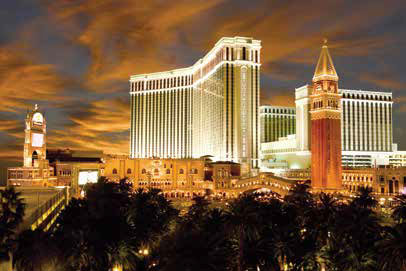
Despite Macau’s recent underworld violence, LVS didn’t take precautions against mob attacks. “They were all laughing at us,” a LVS executive on loan to Macau says. “Everyone we talked to in Macau was sure we weren’t going to succeed.” Behind the scenes, LVS took two other big risks that paid off, knowledgeable sources say. LVS enlisted more than two dozen banks to finance Sands Macao’s construction. If the project failed, it would have burned every potential lender for the company’s future Macau projects. But, since Sands Macao succeeded spectacularly, LVS had banks lining up to finance its Cotai ambitions.
LVS reportedly went ahead with Sands Macao even though it didn’t have all the land issues resolved, banking on the government’s lack of experience and its desire for a fast opening. LVS and others would repeat the tactic, presenting a fait accompli and daring the government to undo it. One expert suggests LVS tried the same thing on Cotai with the Four Seasons apartments that remain unsold more than five years after their construction. Although the practice abated after the Ao Man Long scandal led to more structured government scrutiny of construction projects, the expert cites Louis XIII, a luxury resort under construction on Cotai, as a current example of a developer betting government policies that would prohibit a casino on the site won’t be applied once it’s built.
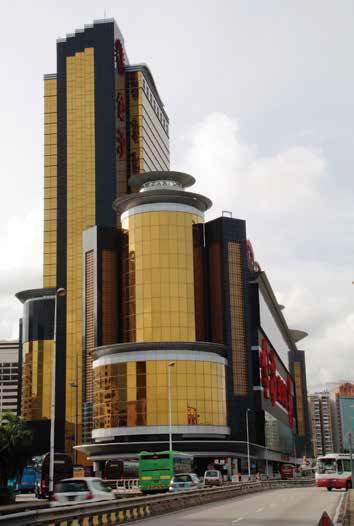
Epidemic of Opportunity
Sands Macao and other operators benefited from another fortunate twist of fate. In late 2002, just as concessionaires were raising funds for new casinos, severe acute respiratory syndrome (SARS) emerged, leaving nearly 1,000 dead in a seven-month reign of terror in southern China and beyond and bringing regional travel to a virtual halt. The outbreak appeared to extend Macau’s losing streak, but instead, SARS became the most fortuitous pandemic in Macau’s history.
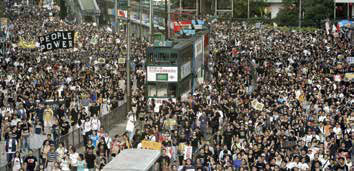
In the wake of SARS, amid mounting evidence that mainland cover-ups had helped spread the disease, Beijing tried to undo the damage to Hong Kong and Macau. In 2003, Hong Kong demonstrated its dissatisfaction on the sixth anniversary of its return to Chinese sovereignty with street protests that drew an estimated 500,000 people. Proposed anti-sedition legislation was ostensibly the protest’s focus, but many believe mainland authorities discerned economic roots, as Hong Kong was getting poorer for the first time in a generation, especially relative to the mainland.
Whether it was unintended irony or political calculation, Beijing’s steps to assist Hong Kong and Macau centered on deepening economic dependence on the mainland. The Closer Economic Partnership Arrangement boosted the cities’ exports to the mainland. More important, the Individual Visitor Scheme (IVS) was instituted, allowing mainland citizens from four cities in neighboring Guangdong province to travel to Macau and Hong Kong without joining a tour group.
The University of Macau’s Mr Siu calls the unforeseen policy change “a huge present to Macau, and hence to Sands Macao, as well as other casino operators here”. From 4.24 million mainland visitors in 2002, the count expanded 35% in 2003 and 66% in 2004 to reach 10.5 million in 2005. IVS now covers more than 50 cities, home to 300 million of the mainland’s wealthiest citizens. Last year, mainland visitors totaled 18.6 market million, 64% of Macau’s total of 29.3 million visitors, with more than 8 million arriving under IVS. Many cite the IVS as the single biggest factor in the explosive growth of gaming in Macau.
Whatever the cause, Sands Macao’s success reverberated widely in Macau and beyond. “Macau was, and to some extent still is, thought of as a somewhat backward ex-colonial enclave, but Sands made investors, operators and regulators globally sit up and take notice that something was afoot to change those perceptions,” Mr Green observes. “Macau still hasn’t been accorded the respect due to it as the world’s largest gaming jurisdiction, but with the presence of world class developers/operators and more of the flagship structures they have brought to fruition, that will change.”
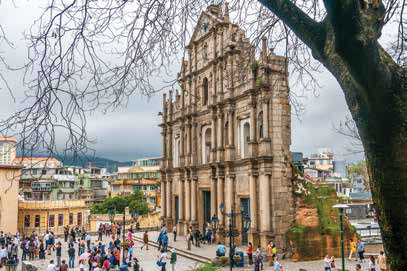
Aaron Fischer, who heads consumer and gaming research for CLSA Asia Pacific Markets, says, “Sands Macao gave all the companies an indication that if they invested in quality facilities then they would generate even higher returns. Sands Macao showed that people were ready to upgrade their experience. We’ve seen that over the past 10 years as a key trend: Chinese consumers have upgraded their tastes and their entertainment experiences.”
Operators elsewhere have joined the bandwagon, Mr Gallaway notes, with Las Vegas now celebrating Chinese New Year and other Asian jurisdictions introducing or expanding gaming, inspired by Sands Macao’s success. “It showed that by providing high-quality gaming environments to regional populations, overall tourism, along with gaming revenue, would grow.”
Mr Godinho says, “Sands Macao helped turn the page from a murky past and a relatively closed environment into the MBA executive era of professional gaming management and gaming as entertainment.”
“It made employment in the industry a desirable and well-paid vocation,” adds Mr Green.
“Ever since the opening of Sands Macao and the subsequent growth of Sands China’s properties at Cotai Strip, Macau has increasingly shown itself to be a world-class destination that has so much to offer beyond gaming,” says Edward Tracy, president and chief executive of Sands China, LVS’ Macau subsidiary. “And throughout it all, Sands Macao has maintained its appeal as a sophisticated luxury destination delivering incredible entertainment, dining and more.”
Sands Macao’s success began the metamorphosis of Las Vegas Sands into the world’s most valuable gaming enterprise. “It turned the company from a Las Vegas company with two assets—Venetian Las Vegas and the Sands Expo Convention Center—into a true international gaming company,” Global Market Advisors partner Andrew Klebanow says.
LVS went public in December 2004, barely six months after the Sands Macao opening, with an initial stock offering valuing the company at US$10 billion. At its peak, its market capitalization exceeded $100 billion. Its value currently is more than $60 billion.
The growth of LVS also transformed its founder and chairman from a Vegas B-lister into the leading figure in global gaming.
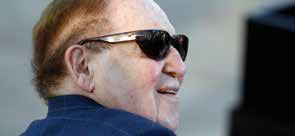
“Sheldon Adelson will be remembered as the person who was the most bullish on Macau,” says Mr Fischer. “He talked about investing $13 billion in Cotai and building 21,000 hotel rooms. It seemed outrageous. But we totaled up the spending [including planned new Cotai resorts]: Galaxy $13 billion, Sands China $11 billion, the others each about $6 billion. But Adelson was always looking at getting other investors and selling off assets. So even he didn’t forecast today’s level of success.
Editor at large Muhammad Cohen also blogs for Forbes on gaming throughout Asia and wrote Hong Kong On Air, a novel set during the 1997 handover about TV news, love, betrayal, high finance and cheap lingerie.






